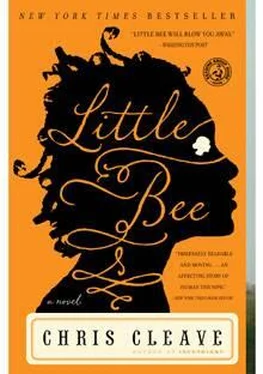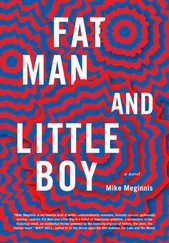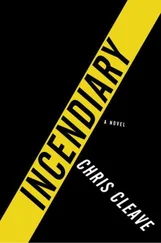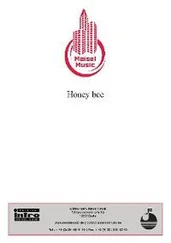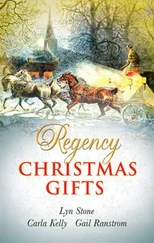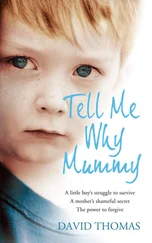But it was gorgeous. I gave myself completely to Lawrence in a way that I never had with Andrew. It happened easily, without any effort on my part. I cried when we made love. It just happened; it wasn’t an act. I held him till my arms ached and I felt agonies of tenderness. I never let him know. I never let him know, either, that I scrolled through his BlackBerry, read his e-mails, read his mind while he slept. When I started the affair, I think it could have been with anyone. It was the affair that was inevitable, not the specific man. But slowly, I started to adore Lawrence. To have an affair, I began to realize, was a relatively minor transgression. But to really escape from Andrew, to really become myself, I had to go the whole way and fall in love. And again, I didn’t have to make an effort to fall in love with Lawrence. All I had to do was to permit myself to topple. This is quite safe, I told myself: the psyche is made to absorb the shock of such falls.
I still cried when we made love, but now I also cried when we couldn’t.
It became a source of worry, hiding the affair. The actual assignations were simply concealed from Andrew, of course, and I made a point of never mentioning Andrew or his work when I was with Lawrence, in case he himself got too curious. I put up a high fence around the affair. In my mind I declared it to be another country and I policed its border ruthlessly.
Harder to disguise was the incontrovertible change in me. I felt wonderful. I had never felt less sensible, less serious, less Surrey. My skin started to glow. It was so blatant that I tried to conceal it with foundation, but it was no use: I simply radiated joie de vivre. I started partying again, as I hadn’t since my early twenties. Lawrence got me in to all the Home Office events. The new home secretary loved to meet the media, to tell them over canapés how tough he was going to be. There were endless soirees, and always an after-party. I met a new crowd. Actors, painters, businesspeople. I felt a thrill I hadn’t felt since before I met Andrew-the thrill of realizing I was attractive, of knowing myself irresistible, of being half drunk on champagne and looking around at the bright, smiling faces and giggling when I realized that suddenly anything could happen.
So I should hardly have been surprised when it did. Inevitably, at one of those parties, I finally bumped into my husband, crumpled and red-eyed from the office. Andrew hated parties-I suppose he was only there on some fact-finding mission. Lawrence even introduced us. A packed room. Music-flagship British music-some band that had made it big on the internet. Lawrence, beaming, flushed with champagne, his hand resting riskily on the small of my back.
“Oh, hi! Hi! Andrew O’Rourke, this is Sarah Summers. Sarah is the editor of Nixie. Andrew’s a columnist for The Times, terrific writer, strong opinions. I’m sure you two are going to get on.”
“So was the priest,” said Andrew.
“I’m sorry?”
“He was sure we were going to get on. When he married us.”
Andrew, lighthearted, almost smiling. Lawrence-poor Lawrence-quickly removing his hand from my back. Andrew, noticing. Andrew, suddenly unsmiling.
“I didn’t know you’d be here, Sarah.”
“Yes. Well. I. Oh. It was a last-minute thing. The magazine…you know.”
My body betraying me, blushing from my ankles to the crown of my head. My childhood, my inner Surrey, reawakened and vengeful, redrawing its county boundaries to annex my new life. I looked down at my shoes. I looked up. Andrew still there, standing very still, very quiet-all the opinion, for once, drained out of him.
That night we stood on the empty foundation at the end of our garden where Andrew was planning to build his glasshouse, and we talked about saving our marriage. Just the phrase is excruciating. Everything Andrew said sounded like his Times column, and everything I said could have been ripped from the agony page of my magazine.
“At what point did we forget that marriage is a commitment for life?”
“I just felt so unfulfilled, so downtrodden.”
“Happiness isn’t something one can pick up off the shelf, it’s something one has to work at.”
“You bullied me. I just never felt loved or supported.”
“Trust between adults is a hard-won thing, a fragile thing, so difficult to rebuild.”
It was less like a discussion and more like a terrible mix-up at the printers. It didn’t stop till I threw a flowerpot at him. It glanced off his shoulder and smashed on the concrete base and Andrew flinched and walked away. He took the car and drove off and he didn’t come home for six days. Later I found out he’d flown over to Ireland to get properly drunk with his brother.
Charlie started nursery that week, and Andrew missed it. I made a cake to mark the occasion for Charlie, alone in the kitchen one night. I wasn’t used to being alone in the house. With Charlie asleep it was quiet. I could hear the blackbirds singing in the twilight. It was pleasant, without Andrew’s constant bass line of gripes and political commentary. Like the drone note of bagpipes, one doesn’t really realize it’s been playing until it stops, and then the silence emerges into being as a tangible thing in its own right: a supersilence.
I remember scattering yellow Smarties over the wet icing while I listened to Book of the Week on Radio 4, and suddenly feeling so confused I burst into tears. I stared at my cake: three banana layers, with dried banana chips and banana icing. This was still two years before Charlie’s Batman summer. At two years old, what Charlie loved most in the world was bananas. I remember looking at that cake and thinking: I love being Charlie’s mother. Whatever happens now, that is the one thing I can be proud of.
I stared at the cake on its wire tray on the work surface. The phone rang.
Lawrence said, “Shall I come over?”
“What, now? To my house?”
“You said Andrew was away.”
I shivered. “Oh, goodness. I mean…you don’t even know where I live.”
“Well, where do you live?”
“I’m in Kingston.”
“I’ll be there in forty minutes.”
“No, Lawrence…no.”
“But why? No one will know, Sarah.”
“I know but…wait a minute, please, let me think.”
He waited. On the radio, the continuity announcer was promising great things for the next program. Apparently there were many misconceptions about the tax credit system, and their program was going to clear up a good few of them. I dug my nails into the palm of my free hand and fought desperately against the part of me that was pointing out that an evening in bed with Lawrence and a bottle of Pouilly-Fumé might be more exciting than Radio 4.
“No. I’m sorry. I won’t let you come to my house.”
“But why not?”
“Because my house is me, Lawrence. Your house is your family and my house is my family and the day you come to my house is the day our lives get more tangled up than I’m ready for.”
I put the phone down. I stood quietly for a few minutes, looking at it. I was doing this to protect Charlie, keeping the distance between me and Lawrence. It was the right thing to do. Things were complicated enough. It’s something I could never have explained to my mother, I suppose: that there are circumstances in which we will allow men to enter our bodies but not our homes. My body still ached from the sound of Lawrence’s voice, and the frustration rose inside me until I picked up the phone and smashed it, again and again, into my perfectly iced cake. When the cake was quite destroyed I took a deep breath, switched the oven back on, and started making another.
The next day-Charlie’s first day at nursery-my train was canceled so I was late back from work. Charlie was crying when I picked him up. He was the last child there, howling in the middle of the beeswaxed floor, smashing his little fists into the play leader’s legs. When I went to Charlie, he wouldn’t look at me. I pushed him home in the buggy, sat him down at the table, dimmed the lights, and brought in the banana cake with twenty burning candles. Charlie forgot he was sulking and started to smile. I kissed him, and helped to blow out the candles.
Читать дальше
